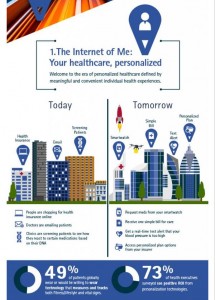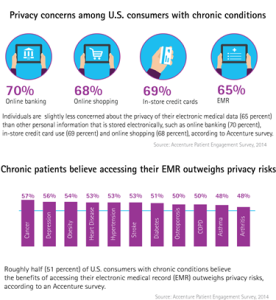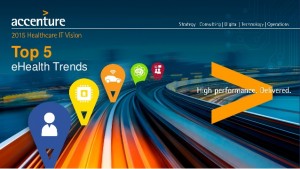We’re entering the era of personalized healthcare promising convenient and meaningful health experiences, according to Accenture’s 2015 Healthcare IT Vision articulated in their report, Top 5 eHealth Trends.
This post is third in three published here on Health Populi this week, exploring the growing role of the Internet of Things in health/care. On 8th July, we dug into McKinsey Global Institute’s research on IoT’s influence over nine industries, including human health; and on the 9th, we reviewed Goldman Sachs’ report on digital health’s potential impact on the U.S. healthcare system.
Accenture’s five eHealth trends include: The Internet of Me; the Outcome Economy, with hardware driving healthy results and smarter medicine; the Platform (R)evolution, supporting connected care and data liquidity; the Intelligent Enterprise, leveraging Big Data, analytics, and cognitive computing; and, Workforce Reimagined, using technology to extend healthcare teams.

Healthcare is personal, and The Internet of Me phenomenon leverages digital technologies to drive care to the N of 1, taking into account a patient’s unique characteristics: health conditions, insurance and payment options, and communications preferences, which together comprise a personalized plans that can bolster health outcomes. See the second chart from Accenture illustrating “Today” and “Tomorrow.” In Today’s healthcare environment, doctors (may) email patients, and people are screened in bricks-and-mortar laboratories to test for medication responses. “Tomorrow,” patients receive simplified bills, communicate with the health system via wearables, and get real-time texts nudging them to eat an orange or take a walk.
This scenario has several underlying assumptions about technology and consumer behavior: consumers use sensors and wearable devices, and data that’s captured are analyzed in algorithms that record the information to some kind of digital health record as well as feeds back actionable advice to the patient. In The Internet of Me, “Me” is amenable to using personal technologies for health care communications, and the health care system stakeholders (doctors, hospitals, labs, and health plans) are IT/data interoperable, analytics-capable, and keen to shared decision-making and virtual care with patients.
These assumptions underlie all 5 of Accenture’s eHealth Trends.
To assemble this report, Accenture interviewed over 100 thought leaders, gathered ideas from Accenture staff, and conducted a global survey of over 2,000 executives in nine countries (including Australia, Brazil, China, France, Germany, India, South Africa, the United Kingdom, and the U.S.), representing ten industry sectors. Australia, Brazil, China,
Health Popul i’s Hot Points: After assessing the three current IoT/healthcare reports this week, I am left thinking about the privacy implications for the IoT in health. Technology is developing far faster than humans can deal with the thorny issues of Big Data, dark data, lack of transparency, and third parties accessing data, in ways both benign and not-so-much.
i’s Hot Points: After assessing the three current IoT/healthcare reports this week, I am left thinking about the privacy implications for the IoT in health. Technology is developing far faster than humans can deal with the thorny issues of Big Data, dark data, lack of transparency, and third parties accessing data, in ways both benign and not-so-much.
I covered this topic at-length last year in my report for California HealthCare Foundation, Here’s Looking at You: How Personal Information is Being Tracked and Used. In that report, I talk about the many uses of digital footprints for public health, FICO scores, and targeted advertising that may or may not be desirable to the N of 1.
Let’s turn to another Accenture report to further mine the privacy issues of IoT in healthcare. The Era of Living Services, published in June, discusses the new consumer living full-on digital life. The report’s last chapter is titled, “Privacy and Ethics: Navigating Our Changing Values.” In this section. Accenture asks, “who will own and have access to all this highly sensitive data?” flowing out of the sensors and digital tech we adopt in daily living, and increasingly, in health and health care.
Accenture’s survey on data privacy found that 80% of 20-to-40 year old’s believe complete data privacy no longer exists, and one-half would not object to their buying behavior tracked if they received “relevant offers” from brands and supplier.
In another survey Accenture conducted last year, results summarized in the last graphic, 2 in 3 U.S. consumers with chronic health conditions express concerns about privacy of their electronic medical data. However, these same patients also tend to believe that accessing their personal health data in electronic medical records outweighs the privacy risks.
In the Living Services report, Accenture discusses consumers’ opportunity to forge and control personal profiles online that branded product companies can get to know, and cater to. In so doing, “Brands that successfully build one-to-one relationships with their customers may well be trusted,” to provide services to those consumers.
Still, brands must risk-manage privacy and security perceptions of their prospective customers through being transparent, enabling user autonomy which ensures consumers can control their data, and keep personal data secure. The benefits of the one-to-one relationships include personalization, adaptation (understanding the changing context of the person), and automation (reducing friction in delivering services and having a streamlined user experience).
These factors will play out in healthcare as well, and perhaps even more-so — transparency, patient autonomy and self-efficacy, and PHI (personal health information) security…these are all highly valued by health consumers. And reducing friction in payment, clarity of medical bills, and evolving healthcare text messages to changing contexts like blood pressure movements, blood sugar levels, and mood? These would bring new meaning to the phrase “living services.”





 I'm gobsmackingly happy to see my research cited in a new, landmark book from the National Academy of Medicine on
I'm gobsmackingly happy to see my research cited in a new, landmark book from the National Academy of Medicine on 
 Grateful to Gregg Malkary for inviting me to join his podcast
Grateful to Gregg Malkary for inviting me to join his podcast